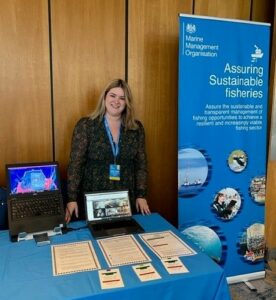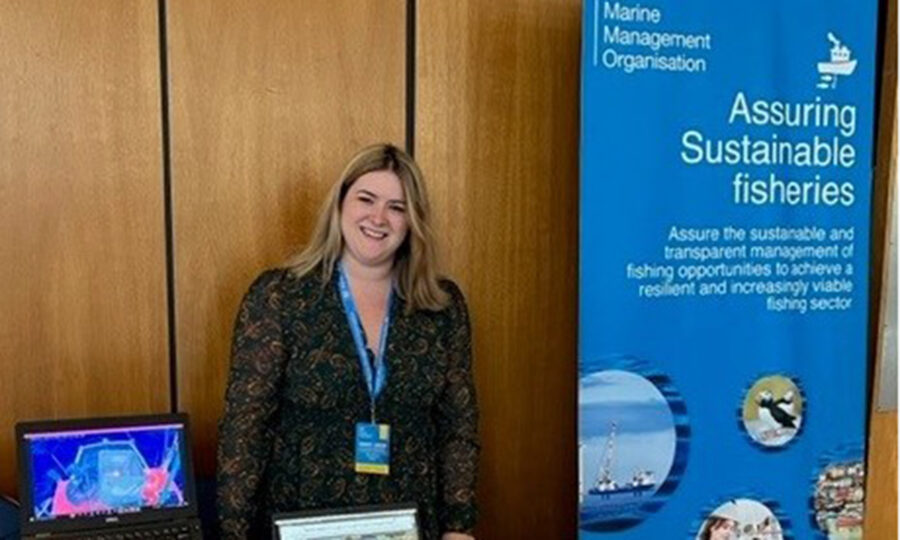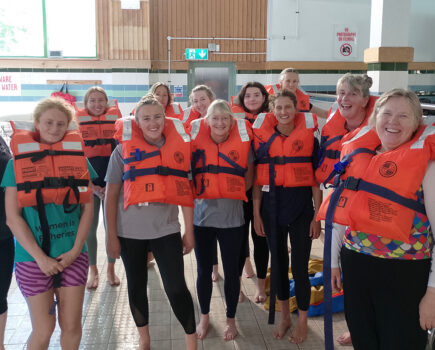On the two-year anniversary of the creation of Regional Fisheries Groups (RFGs) in England, the MMO last week issued an appeal to fishermen to continue to participate, and to reach out to MMO and Defra officials supporting the initiatives.
The RFGs, created in March 2021, are designed to promote and improve discussion on collaborative fisheries management between the inshore fleet, industry and managers, including Cefas scientists and IFCAs.
After six rounds of meetings, the RFG team will be continuing to increase its engagement with inshore fishers and the industry in 2023.

RFG principal fisheries manager Courtney Inch at a fisheries engagement event. More are planned around the coast in 2023.
There will be an increased focus on meeting fishers and industry locally, with plans for quayside visits and meetings with fishers in more than 50 coastal locations this year alongside more formal meetings per region, hosted online. These follow on from a long series of port visits in 2022.
Paul Gilson, chairman of the NFFO and a regular participant at meetings, particularly in the South East, where he spent his fishing career operating an inshore trawler, told FN: “The intention and thought process behind the RFGs is really good.
“The meetings I have attended, and the involvement of officials, have also gone very well, and provided a lot of input and knowledge to fisheries managers, about the issues threatening the livelihoods of many inshore fishermen in particular.
“What we do need now, though, is the translation of these good intentions into action. In the South East, we have seen the sole fishery disappear as a commercial option. The fish simply are no longer there. We are aware of the inshore survey carried out as a result of our conversations at the RFG, but what we have yet to see are any results.
“I would urge fishermen to continue the dialogue at the RFGs and share views on the crises that in many areas are pushing inshore fishermen out of business. But I would also like to stress the need for 2023 to produce tangible results for fishermen, many of whom otherwise face going out of business by the end of the year.”
A spokesperson for the MMO said: “So far, the discussions in previous meetings and at quayside visits between industry and regulators, policy-makers and senior scientists have seen the groups make some significant gains for industry – for example, the North West RFG fishers raised the disparity between the amount for grant funding available for bottom-towed gear and other gear types.
“As a result of these discussions, Defra secured match-funding rates for any vessel with a length of 12m or less to be raised to 80% for health and safety projects, regardless of the type of gear used.
“Following conversations in the South RFG, the MMO opened a window for Category B and C licences to apply for additional quota.
“The South East RFG spoke about the reduced levels of sole in the region, resulting in Defra commissioning an inshore small fish survey in the southern North Sea, which was carried out in September 2022.
“The South West RFG raised a disparity between small-eyed ray quota in ICES areas VIId/f and lack of quota in VIIe. The MMO commissioned a survey of small-eyed ray with the aim of removing the non-retention policy in VIIe. The outcome is expected to be progressed in 2023.
“We have had similar conversations in the other RFGs. If you would like to join your local group or have questions, issues or opportunities you think we can help you with, please get in touch by email at: regionalfisheriesgroups@ marinemanagement.org.uk”
Further details of RFG activities are available here.
This story was taken from the latest issue of Fishing News. For more up-to-date and in-depth reports on the UK and Irish commercial fishing sector, subscribe to Fishing News here or buy the latest single issue for just £3.30 here.








